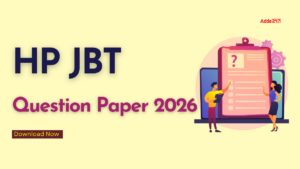Table of Contents
The wait for the 8th Central Pay Commission (CPC) may finally be ending soon. Union Minister of State Jitendra Singh has assured representatives of employee unions that the government is actively working to set up the new Pay Commission. Discussions have also begun with the Pension Secretary on the possibility of restoring the Old Pension Scheme, a long-pending demand of employees. For lakhs of teachers across India, whether PRT, TGT, PGT, Assistant Professors, or Lecturers, this move could bring a massive financial boost.
Latest Update on 8th Pay Commission
The government is getting ready to set up the 8th Central Pay Commission (CPC), which is expected to start from January 2026. Union Minister Jitendra Singh has assured employees that the process will begin soon. If the new rules are approved, the minimum salary may rise from Rs. 18,000 to Rs. 51,480, and the minimum pension from Rs. 9,000 to Rs. 25,740. Teachers, professors, and lecturers will also get higher allowances like DA, HRA, and TA.
8th Pay Commission: Key Highlights
- 8th Central Pay Commission (CPC) likely from January 2026
- Salary hike to benefit over 1 crore employees and pensioners
- PRTs, TGTs, PGTs, Assistant Professors, Lecturers, and Professors to see major pay revision
- Fitment factor may rise to 2.86 from 2.57, nearly tripling salaries
- Minimum pension may increase from Rs. 9,000 to Rs. 25,740
- DA hike of 3% likely before Diwali, adding to benefits
8th Pay Commission for Teachers
For school-level teachers, salaries have often been a key point of concern. Under the new structure, primary teachers (PRTs), trained graduate teachers (TGTs), and post-graduate teachers (PGTs) will see higher entry-level salaries and stronger pension security. This will not only help in attracting young talent into the teaching profession but also improve retention in government schools.
8th CPC Impact on Assistant Professors and Lecturers
For college and university faculty, the 8th CPC will revise pay scales at all academic levels. This includes Assistant Professors, Associate Professors, and Professors. A higher fitment factor means their gross salaries could nearly triple compared to the 7th CPC scales. With rising living costs and growing responsibilities, this hike will offer much-needed financial stability.
Revised Expected Salary & Pension Hike Under 8th CPC
The proposed fitment factor of 2.86 could lead to a sharp increase in salaries and pensions for teachers at different levels.
| Pay Level | Current Salary (7th CPC) | Expected Salary (8th CPC) | Current Pension | Expected Pension |
|---|---|---|---|---|
| Level 1 (PRT entry) | Rs. 18,000 | Rs. 51,480 | Rs. 9,000 | Rs. 25,740 |
| Level 5 (TGT) | Rs. 29,200 | Rs. 83,512 | Rs. 14,600 | Rs. 41,756 |
| Level 10 (Assistant Professor start) | Rs. 56,100 | Rs. 1,60,446 | Rs. 28,050 | Rs. 80,223 |
| Level 13A (Professor) | Rs. 1,31,100 | Rs. 3,74,946 | Rs. 65,550 | Rs. 1,87,473 |
| Level 18 (Top grade) | Rs. 2,50,000 | Rs. 7,15,000 | Rs. 1,25,000 | Rs. 3,57,500 |
DA Hike Alongside 8th CPC
Alongside the 8th CPC, reports suggest that the Dearness Allowance (DA) may be hiked by 3% before Diwali. Currently, central employees, including teachers, get 55% DA, and the increase will directly boost take-home pay. If both announcements are made in October, it could be a festival bonanza for over 1.2 crore employees and retirees.
Why 8th CPC Implementation Matters for the Education Sector
The education sector is one of the biggest beneficiaries of every Pay Commission. From school teachers (PRTs, TGTs, PGTs) to college faculty (Assistant Professors, Lecturers, and Professors), the 8th CPC will directly decide their pay scales, allowances, and pensions.
- Higher entry-level salaries for school teachers are making the profession more attractive.
- Better financial security for professors and lecturers in universities.
- Improved pensions for retired teachers, ensuring dignity after service.
- Retention of talent in government schools and colleges, reducing the shift towards private jobs.




 HP JBT Teacher Question Paper, Download ...
HP JBT Teacher Question Paper, Download ...
 CTET 2026 Paper-II Re-Exam Notice, Revis...
CTET 2026 Paper-II Re-Exam Notice, Revis...
 Preparation Tips for MP SET Exam 2026, T...
Preparation Tips for MP SET Exam 2026, T...













